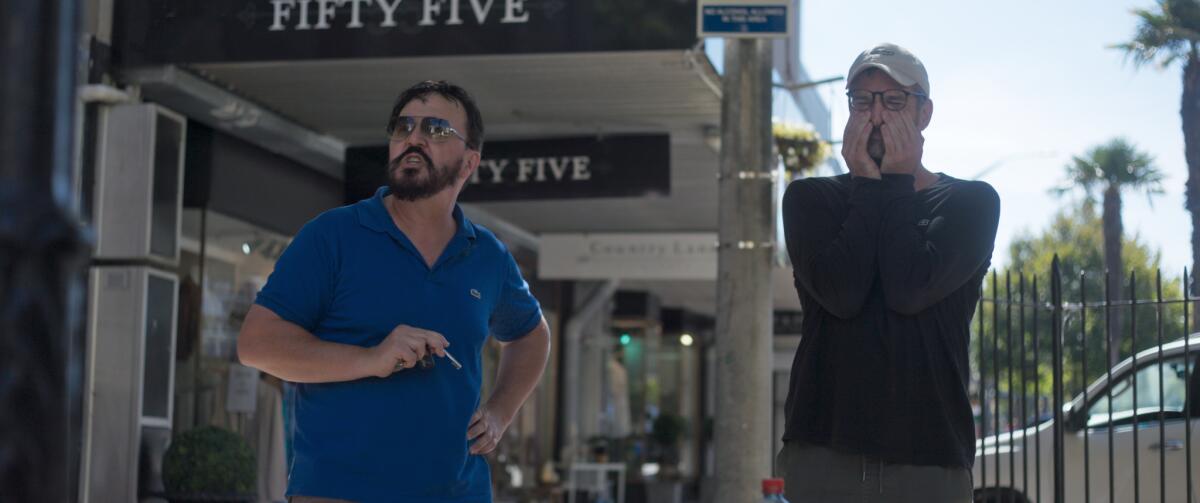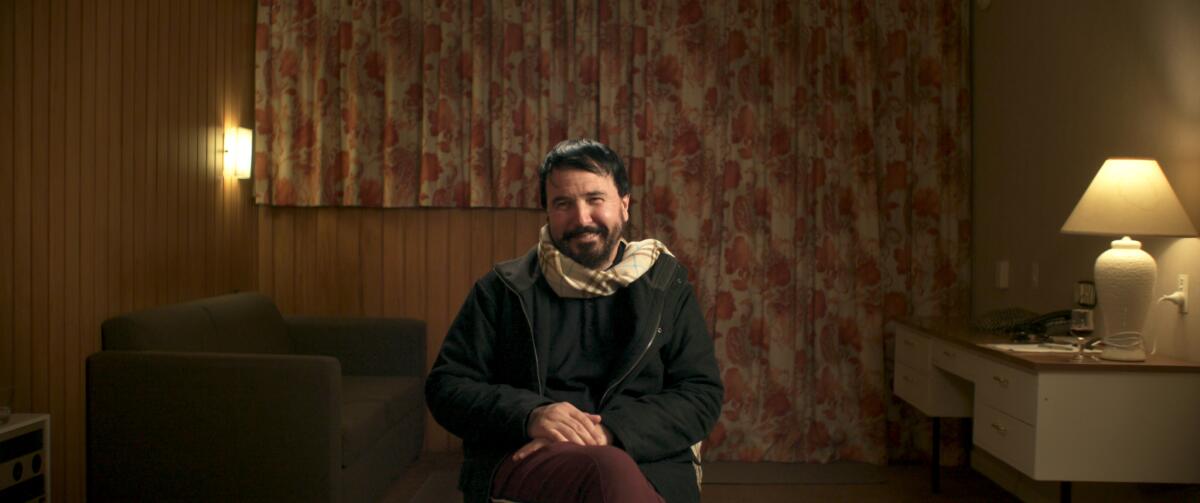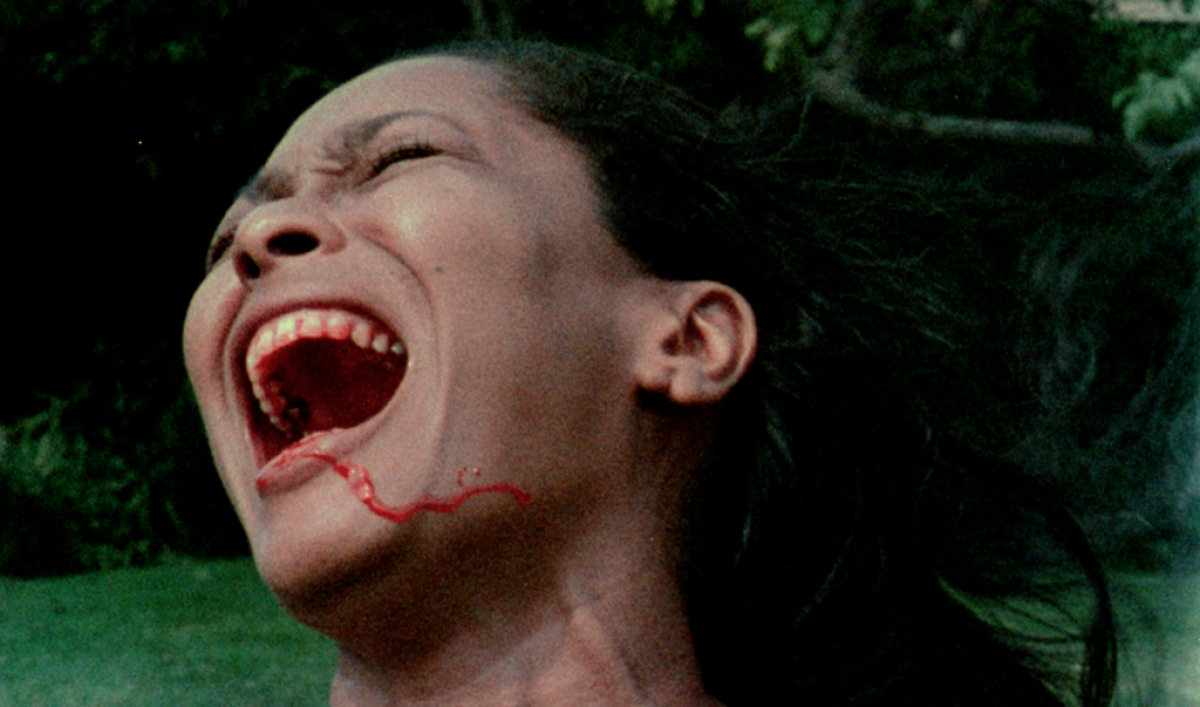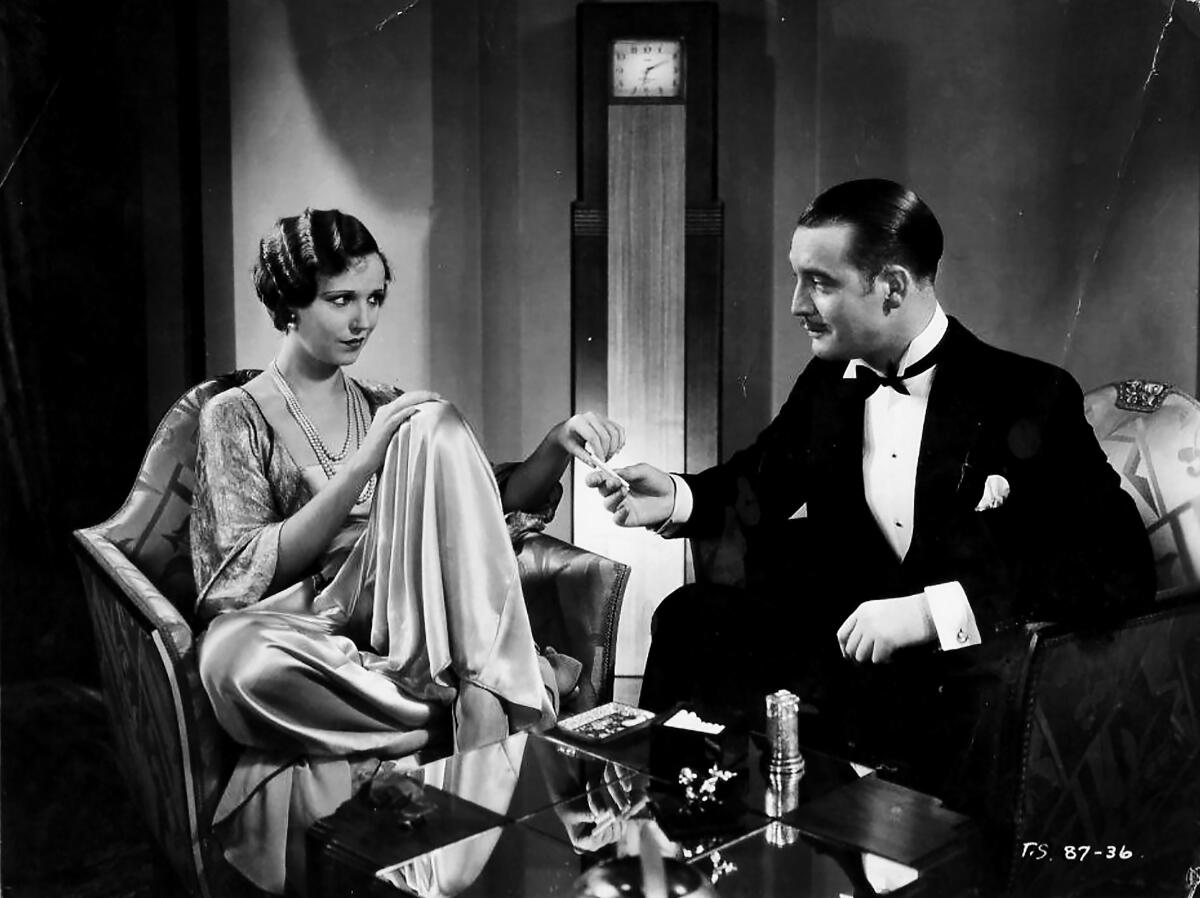The ‘weird mess’ of ‘Mister Organ,’ plus more of the week’s best movies in L.A.

- Share via
Hello! I’m Mark Olsen. Welcome to another edition of your regular field guide to a world of Only Good Movies.
‘The Royal Hotel’

Among this week’s new releases is the psychological thriller “The Royal Hotel,” the latest film from Australia‘s Kitty Green. When two American women (Julia Garner, Jessica Henwick) run out of money while backpacking through Australia, they wind up working in a pub in a remote mining town.
I spoke to Green about the film and how, while it is clear what the potential threats against them are, it is never certain just how sinister anyone’s intentions are, or whether the women are in any real danger.
“That sort of space that you sit in often as a woman, where you’re kind of like, ‘Oof, I don’t know about this,’ is kind of where the film exists,” said Green. “And what do you do with that kind of feeling of discomfort and when do you stand up for yourself? When do you say no? When do you say enough is enough? What we kind of permit or tolerate in those spaces was an interesting discussion point for me.”
Meet ‘Mister Organ’

As we head toward Halloween, one of the most terrifying and discomforting movies of the season may be the documentary “Mister Organ,” from New Zealand filmmaker David Farrier, who previously made the equally unsettling “Tickled.” When Farrier begins to look into an unusual situation involving late-night parking wars in an upscale neighborhood, he finds himself unexpectedly a new target for Michael Organ, a self-styled character who has a way of inveigling his way into people’s lives and taking them over.
Over time, Farrier finds himself subject to annoyances big and small, and Organ somehow produces a key to Farrier’s home, all with an endless nonstop patter of conspiracies and recriminations. Fans of the series “What We Do in the Shadows” will recognize Organ as a parallel to the “energy vampire” character of Colin Robinson. Part of what makes the story so unsettling is that it is difficult to describe exactly what it is that Organ does. Do words like ”con man” or “grifter” quite apply?
“He is a con man and he is a grifter, but what I personally found fascinating about him early on is that for him it’s not really about the money — he just likes psychologically tormenting people,” said Farrier in a recent interview. “He just likes to get into your head and f— with you in a really intense way. So he is a con man and he is a grifter, but I also think he just loves tormenting people mentally. I found that aspect to him very interesting because I find con men boring, like there’s a million con men. I just found his obsession with breaking people down fascinating.”
Farrier didn’t expect to become so deeply embroiled in the story himself, though he was initially drawn to its sheer oddness. As he says early in the film, “This is exactly my kind of weird mess.”
But there were consequences. “I didn’t expect him to take such an active interest in me and to turn all his focus onto me,” said Farrier. “I thought it would be more me telling a story about his victims and figuring out what makes him tick. But he got equally as obsessed with me as I got obsessed with him. And so I maybe perhaps naively never expected it to get quite as intense as it does.”
Farrier says that Organ has responded to the movie in two ways. One is that Organ was repeatedly spotted at a movie theater near his home that was playing the film, sitting in the theater and talking through the whole movie, unnerving moviegoers who realized who he was as the movie unfolded. Additionally, he embroiled Farrier in court cases that ate up a lot of time and money.
“Increasingly, there are Mister Organs everywhere,” says Farrier. “Everyone’s run into versions of him in their lives. I just hear from so many people that are like, Oh, that was my brother, or that was my dad, or that was my boyfriend.
“There’s mostly no crime being committed, but they’re still going through life damaging so many people,” said Farrier. “And I think that’s a personality type that’s thriving, particularly at the moment. Michael’s someone who just decides on his own version of reality and runs with it and lies and lies. But it works really well for him. He’s sort of invincible. I feel like he’s living in the perfect time.”
Only good movies
Get the Indie Focus newsletter, Mark Olsen's weekly guide to the world of cinema.
You may occasionally receive promotional content from the Los Angeles Times.
‘Ganja & Hess’

Written and directed by Bill Gunn, 1973’s “Ganja & Hess” has overcome initial distribution issues and a disastrous recutting by producers to be fully restored to its original form and rightly recognized as a landmark in Black horror for its hallucinatory, atmospheric visuals and dense thematic concerns. Whammy Analog Media will be screening the film on Monday, Oct. 9, presented by horror scholar Lea Anderson.
In the film, anthropologist Hess Green (“Night of the Living Dead” star Duane Jones) is stabbed with a ceremonial dagger by his assistant, George (Gunn), who then kills himself. Hess is transformed into a vampire and when George’s wife, Ganja (Marlene Clark), arrives, Hess turns her as well.
In 2019 horror author and film historian Tananarive Due said to The Times of the film, “Bill Gunn basically shed all studio expectations and just made a vampire movie his way, which is about addiction and class and where we get to be self-reflective among ourselves. It’s not even so much about race, really. We got to turn the lens inward and express ourselves and our humanity, our frailties and our struggles.”
Other points of interest

‘Leftover Ladies’ at UCLA In terms of sheer rarity, the thing to see this week might be 1931’s “Leftover Ladies,” directed by Erie Kenton, which is being screened on Sunday, Oct. 8, by the UCLA Film & Television Archive in a 35mm print on loan from the Library of Congress — it’s the only known copy of the film in the United States. With a Pre-Code storyline involving divorce, ambition, affairs and lots of drinking, the film will be introduced by scholar Marsha Gordon, who recently published “Becoming the Ex-Wife: The Unconventional Life and Forgotten Writings of Ursula Parrott.” (There will be a book signing before the screening.)
‘Days of Heaven’ at the Academy On Sunday, Oct. 8, the Academy Museum will screen Terrence Malick’s second feature, 1978’s “Days of Heaven,” in a new 35mm print in the David Geffen Theater, which should be an incredible way to experience one of the most ravishingly beautiful movies ever made, with Oscar-winning cinematography by Néstor Almendros and an Oscar-nominated score by Ennio Morricone. The film also features art direction by Jack Fisk, who worked on Martin Scorsese’s upcoming “Killers of the Flower Moon.”
The film sets up a romantic triangle between the impossibly beautiful Richard Gere, Brooke Adams and Sam Shepard in the Texas Panhandle in 1916. Linda Manz, who plays Gere’s little sister, contributes astonishing voice-over narration. After “Days of Heaven” Malick would not make another movie for 20 years.
Writing about the film for The Times in 2007, Dennis Lim celebrated the film’s “powerful strangeness,” adding, “It’s clear that ‘Days of Heaven’ stands as this singular filmmaker’s statement of purpose. It’s a crystalline expression of what Malick, like few filmmakers before or since, has striven for in his work: the possibility of a new language for narrative cinema.”
“The Persian Version” screening Next Tuesday, Oct. 10, we’ll have one of our Indie Focus Screening Series events at the Lumiere Music Hall in Beverly Hills with Maryam Keshavarz’s “The Persian Version,” a semiautobiographical comedy-drama about a young woman struggling to be true to both herself and her family. Keshavarz will be there for a Q&A after the film, which won both the Waldo Salt Screenwriting Award and the U.S. Dramatic Competition Audience Award when it premiered earlier this year at Sundance.
John Carney at the Cinematheque Beginning Thursday, Oct. 12, the American Cinematheque will have a tribute to the charming musical films of Irish filmmaker John Carney. The series opens with the delightful ’80s tribute “Sing Street” and the Oscar-winning “Once,” and closes with “Begin Again,” starring Keira Knightley and Mark Ruffalo. Carney himself will appear with the screening of the new “Flora and Son” along with producer Anthony Bregman and composer-songwriter Gary Clark.
I recently spoke to Carney about “Flora and Son,” which stars Eve Hewson as a mother trying to connect with her teenage son through a shared love of music. Carney talked about how he wanted to find new uses for music and the exploration of its creation as a part of his storytelling.
“At the beginning of this process, I was like, ‘Can I get away with another light musical with people singing and falling in love?’” said Carney. “And then I was like, maybe they’re not falling in love. Can I bring that sense of possibility and collaboration to a more grown-up, nonromantic story? … And I feel like as a filmmaker, I need to push myself a little bit further, but I do like working in that musical sort of whimsy.”
Only good movies
Get the Indie Focus newsletter, Mark Olsen's weekly guide to the world of cinema.
You may occasionally receive promotional content from the Los Angeles Times.




